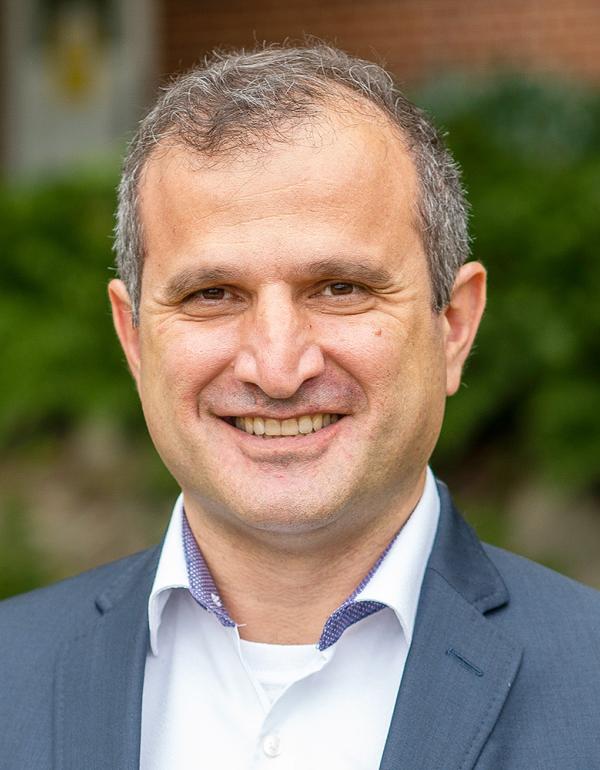
Education
- Cornell University, Ph.D. Ithaca, NY, 1999
- Russian Academy of Sciences, Higher Chemical College, Undergraduate Studies, Moscow, Russia, 1994
Professional Experience
- Director, Chemical Physics Program
- Monroe Martin Professor, Chemistry & Biochemistry and Institute for Physical Science and Technology, 2014-present
- Monroe Martin Associate Professor, Chemistry & Biochemistry and Institute for Physical Science and Technology, 2010-2014
- Assistant Professor, Department of Chemistry, The University of North Carolina at Chapel Hill, 2004-2010
- Molecular and Cellular Biophysics Program Faculty, The University of North Carolina at Chapel Hill, 2004-2010
- Department of Chemistry, University of California, San Diego La Jolla, CA – NIH Postdoctoral Research Associate; Adviser: Prof. P. G. Wolynes, 2001-2004
- Department of Chemistry, The University of Pennsylvania Philadelphia, PA – Postdoctoral Research Associate; Adviser: Prof. M. L. Klein, 2000
- Department of Chemistry, Cornell University Ithaca, NY – Graduate Research Assistant; Ph.D. Adviser: Prof. R. Hoffmann, 1995-1999
Research Interests
Garegin Papoian is the Monroe Martin Professor, with joint appointment in Chemistry and Institute for Physical Science and Technology. His group is striving to understand complex biological phenomena based on fundamental physical and chemical principles. His current research interests include DNA packing in cells of higher organisms and cellular cytoskeleton and motility.
Students and postdocs in the Papoian group use theoretical physical chemistry techniques, including advanced computational methods, to study biological processes at multiple scales, from single protein functional dynamics and chromatin folding and stability to cell-level processes, such as stochastic signal transduction and regulation of cell motility. Group members are exposed to diverse areas of equilibrium and nonequilibrium statistical mechanics, polymer physics, computational protein modeling and bioinformatics. Two on-going projects are briefly outlined below.
The Papoian group develops detailed computational models of the way eukaryotic cells move around and sense their environment. Cell motility plays a key role in human biology and disease, contributing ubiquitously to such important processes as embryonic development, wound repair and cancer metastasis. Physical chemistry behind these complex, far-from-equilibrium mechano-chemical processes are poorly understood. Papoian group’s research aims to elucidate the mechanism and dynamics of the self-assembly of actin-filament networks and bundles, which, in turn, drive cell’s leading edge and allow the cell to project long, finger-like protrusions to probe for attractant and repellant cues in cell’s exterior. They collaborate with biologists to experimentally verify computational model predictions and suggest new classes of experiments. Successful completion of their research would allow for better rational control of biochemical reaction circuits that regulate eukaryotic cell motility.
Papoian’s lab also aims to understand the way DNA is packaged in the nuclei of higher organisms. The total length of DNA in each eukaryotic cell can reach 2 m, however, it must be housed in a micrometer size cell. This staggering six orders of magnitude compaction is achieved by wrapping DNA around protein octamers called histones, to form nucleosomes. The latter in turn fold into a superstructure called the 30-nm fiber, which then further folds into higher order chromatin structures. The exact mechanisms of chromatin formation and dynamics are not fully understood, but misregulation of chromatin may result in human genetic diseases. Papoian’s lab develops physico-chemical computational models to study the chromatin folding and dynamics.
Major Recognitions and Honors
- 2010 ACS Hewlett-Packard Outstanding Junior Faculty Award
- 2009-2014 National Science Foundation CAREER Award
- 2008-2013 Camille Dreyfus Teacher-Scholar
- 2007-2010 Beckman Young Investigator
- 2004-2009 Camille and Henry Dreyfus New Faculty Award
- 2005 R. J. Reynolds Excellence Junior Faculty Development Award, The University of North Carolina at Chapel Hill
- 2001-2004 National Institute of Health Postdoctoral Fellowship



